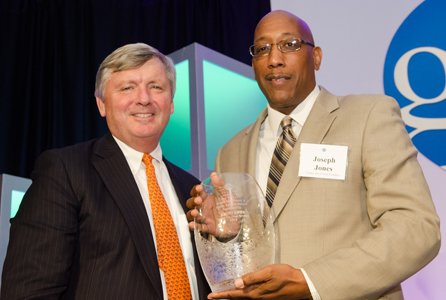BALTIMORE — Angela Robinson said she desperately needed to make changes in her life.
A lifelong Baltimore resident, Robinson had gone five years without meaningful employment, she had no income, and she possessed very little enthusiasm about the prospects of landing a job because she said she lacked the skills and training necessary for the working world.
“Some friends knew about the STRIVE program at the Center for Urban Families and, at first I was hesitant to make that commitment, but I’m so glad that I did,” said Robinson, who after graduating the program last year, landed a job with Health Care for the Homeless, a Baltimore nonprofit that provides health related services, education and advocacy to the homeless.
STRIVE is an attitudinal-based employment training and placement services program for low-income men and women in Baltimore. It also provides job retention and career advancement services and a work support initiative.
The program takes, “30 days of pure commitment and it puts you in a professional setting with you wearing professional attire and being on time each day from 9 a.m. to 5 p.m.,” said Robinson, who graduated in July and, after three interviews, landed her first job in September after more than five years without work.
Founded in 1999, the Center for Urban Families has been at the forefront in addressing the city’s most pressing issues, including poverty, unemployment, father-absence and family disintegration.
The center’s CEO, Joseph Jones, said officials maintain an unwavering focus on addressing the key challenges of Baltimore’s urban families by working to connect fathers to their children, creating opportunities for economic and financial security through work, and providing access to other key interventions and supportive services.
“Our goal is to get people above ground and back into the mainstream,” said Jones, who in September was named as one of CNN’s heroes of the week for his work in helping thousands change their lives for the better.
Jones also earned the 2013 Walter Sondheim Public Service Award for his work to connect low-income urban men and women to career paths and strong family models.
Jones said the STRIVE program represents one part of that mission.
“First, you’ve got to build a reliable and strong foundation to help you weather almost any storm and we give you the principles to do that and if you apply them, you will,” Jones said.
“Next, regardless of your life circumstances, you will be able to do what [Angela Robinson] did and get employed. She followed through on the plan that we presented and it has worked out for Angela and so many others.”
With help from various grants, including the Abell Foundation, whose initial $250,000 grant helped to start “STRIVE,” the center has served about 27,000 individuals in various programs including, STRIVE, where 1,200 to 1,500 attend each year, according to Jones.
“On average, we graduate about 350 individuals per year,” Jones said. “Most people will have to realize that the job they’re getting initially won’t be a job that pays $40-50,000 a year. It’s going to be a starter job because we’re working with people who have very challenged backgrounds. Then, you must look at yourself and say, ‘I’ve got to develop a plan for me, I can’t get caught up in somebody else’s dream, I have to get caught up in my own dream.’”
Jones also noted that the center’s unique service model, Family Stability and Economic Success, is an integrated and comprehensive approach to addressing the needs of their target population.
The model targets two critical areas— chronic unemployment and family instability— and ultimately brings together the use of streamlined accountability systems, co-located and bundled resources and partnerships, and an intensive system of family strengthening and economic stability-focused wrap around services and interventions to address the needs of low-income families and workers in a holistic and effective manner, Jones said.
“If we don’t crack the code of men having babies for whom they’re not responsible for, and if we don’t help people to see the importance of steady employment, all of our efforts to build a better Baltimore will be limited,” he said.
